Argentina’s brand-new productive development minister speaks of his recent ambassadorial stint in Brazil, assuring that his new post is a continuation of his agenda in the neighbouring country.
Valued by Kirchnerism for his loyalty and a personal friend of Alberto Fernández, Frente de Todos is betting on Daniel Scioli’s capacity as a communicator and his ability for taking the stress out of situations.
Scioli, 65, opens up on his presidential run in 2015 and the ruling coalition’s hopes in 2023.
In my last interview with you last November, I asked you whether you would accept a ministerial post where you could build on your work as an ambassador to Brazil in economic issues and development. And not just in that interview but also another with the journalist Alejandro Bercovich in the same month, you mentioned that you were in line for the Productive Development Ministry following the PASO primary defeat. So was it finally a self-fulfilling prophecy, did it have to be that portfolio?
What happened happened and that Saturday night President Alberto Fernández called me saying: “Daniel, I need a favour from you, that you take charge of the Ministry.” I told him: “Alberto, you know that you can always count on me for anything, we’re friends, you know my commitment, just give me a few days to sort things out.” Apart from having my residence [in Brazil] and belongings there, I could not cut off my phase there but had to show some respect for so many people who helped me to reconstruct that business, governmental, ministerial and diplomatic relationship. I wanted to take my leave of President [Jair] Bolsonaro personally.
Were you expecting it?
No, I really wasn’t because as of the resignation of [Matías] Kulfas, there was talk of other people, all very qualified for that Ministry. But the president told me: “You have great knowledge of all the business world, we know the empathy they have with you and your experience, I need you there.” So I told him half-jokingly: “Alberto, you know you can always count on me to cut the grass at Olivos or whatever – what I ask from you is to allow me to do things my way, according to my track record.” And those were the instructions he gave me for Brazil, saying: “Do what you have to do, if you have to take a speedboat ride with Bolsonaro, do so. But we have to reconstruct the relationship with Brazil thinking of what is best for Argentina.”
Your photo with Bolsonaro on your last day was an epilogue. How do you see his electoral chances in October now that you are no longer ambassador to Brazil?
Experience indicates that elections are defined in the final sprint and there are still three months and a bit to go for the first round. If you look objectively at the opinion polls, [Luiz Inácio] Lula [da Silva] is en route to winning the presidency. But on the other hand, Brazil is a country of sufficient diversity and size to have a hidden vote which is not expressed in the opinion polls – something which has to do with the deep hinterland of Brazil and the final strategy of the candidates.
Let us recall my own presidential election against [Mauricio] Macri in 2015. Three months beforehand I had the lead and then it turned round. Now with the political construction put together by Lula thinking of the run-off, everything points to that – how the campaigns are positioned. I’ve conversed with both of them regarding what we should do between Argentina and Brazil together in the times lying ahead in an international context which challenges us and pushes us to join forces responsibly in the food, energy, electromobility, lithium, potash and fertiliser sectors – the whole agro-industrial chain. We must reach a maxi-agreement and obviously, due to Lula’s characteristics and the empathy he has with President Alberto Fernández, that can be done, giving Argentina a major boost.
In the first post-pandemic year, Brazil and Argentina recovered what they had lost the previous year. Argentina plunged more and rebounded more. Brazil fell less and recovered less but both returned in 2021 to their 2019 situation. Now this year Argentina is growing five percent and Brazil less than two percent. Over and above the electoral consequences which this might have in Lula’s favour and against Bolsonaro, to what do you attribute the greater growth of Argentina as against Brazil, sharing more or less the same structure of beneficial price increases from the commodities?
Our country has a particular capacity for recovery which has also been put to the test at other times in our history. I think that the productive matrix has used the commodity price increases to reorder the Argentine economy with a focus on re-industrialisation while I see in Brazil a different kind of political difficulties, an intense atmosphere in different institutions of the country. There might be uncertainty as to the election results and also an inflation which is hitting hard, the worst in the last 30 years.
Could it also be because the policies of [Brazilian Economy Minister] Paulo Guedes are more similar to those of Macri, while Argentine economic policy is more similar to Lula?
Yes.
I’d like you to share with readers that time with Lula before the 2015 elections when he called you to say: “If you don’t win, we’ll lose in Brazil, you’re obliged to win because if not, it will produce a knock-on effect.”
“Do what you have to do but win the election because it will have an impact throughout Latin America,” is what he told me. He even went further, characteristically for Lula, when he told me: “If you have to badmouth me or Dilma [Rousseff] to win, do so, no problem, but win.” And I believe that now, with the responsibility of his candidacy, he is doing everything he can to win. The political construction behind his choice of running-mate, the alliance with other parties, his message of conciliation seeking concord and fraternity, retrieving the best of his government and projecting it into the future with a very special chapter in international policies. But we should not underestimate Bolsonaro, who is in government and still has three months ahead of him.
Did you recommend anybody to be your successor in Brazil?
No, but there is a team assembled to give institutional continuity with my number two as chargé d’affaires, a highly experienced career diplomat who even took charge of the Embassy when I could not arrive for six months due to the pandemic, until August, 2020 – Pablo De Angelis will surely be in charge until the president decides on a new ambassador. It might also be a question of awaiting the electoral result.
Did you speak to Matías Kulfas?
Yes, of course. I’ve always been fanatical about ordered transitions. When I became ambassador, I met with all my predecessors from every political party – for example, with Carlos Magariños, Diego Guelar, obviously with Luis María Kreckler, Pablo Lohlé and others. The same when [Buenos Aires Province] governor, I remember my chats with Felipe [Solá] and with [Eduardo] Duhalde because one cannot think from the start that everything was done badly or come along to refound a ministry, which also has its own alignment as well as very ordered and clear policies. There I had an extended talk with him because if there was one ministry on which I based my agenda with Brazil, it was that headed by Matías Kulfas – we linked up all the time.
Are you a political asset for the Cabinet because you are neither Kirchnerite nor pro-Alberto but an expression of autonomous pan-Peronism?
No, I’ve become very pragmatic. That’s life and my experience of Brazil when I heard Guedes himself tell me: “Daniel, here it’s not a question of left or right, here things are either good or bad for our country.” So I’m a working guy committed to my country where I have always shown myself ready to take on challenges instead of speculating in particular moments.
If you analyse my political career, this year marks the 25th anniversary of my entry into politics when I climbed off my speedboat to contest a primary against Miguel Ángel Toma. Everybody said: “But what are you trying to do? They’ll beat you easily.” And when I moved to the Tourism & Sports Ministry, they said: “But you are committing political suicide, you’ve just won a seat in Congress,” but I felt that I could best help the country at that time with the recovery of jobs and regional economies via tourism. When I became Néstor’s running-mate, they said to me: “Listen, you have no chance.” And well, I had faith and took the plunge. When I started out as [Buenos Aires Province] governor and was very well positioned as a City mayoral candidate, they told me: “You’re not going to make it, BA Province has structural problems, etc.” I committed myself and when I went to Brazil, they said to me: “Brazil, with Bolsonaro?” But challenges have always inspired me in life and right now I feel that I can contribute with my experience.
In the previous interview you said that you managed to heal the rift with Brazil in your ambassadorial mission. Do you think that you can also heal the rift within Frente de Todos and the differences between its sectors?
I believe that the productive development agenda has to be a state policy uniting all political sectors and not just the diversity within Frente de Todos because it has not otherwise been possible to unite labour, industry, the creation of the first job and all the impact which that has in the middle class – that has to be a state policy. We want a country with science and technology adding value to its raw materials – a dynamically productive country. I feel that this is an agenda which naturally lends itself to consensus.
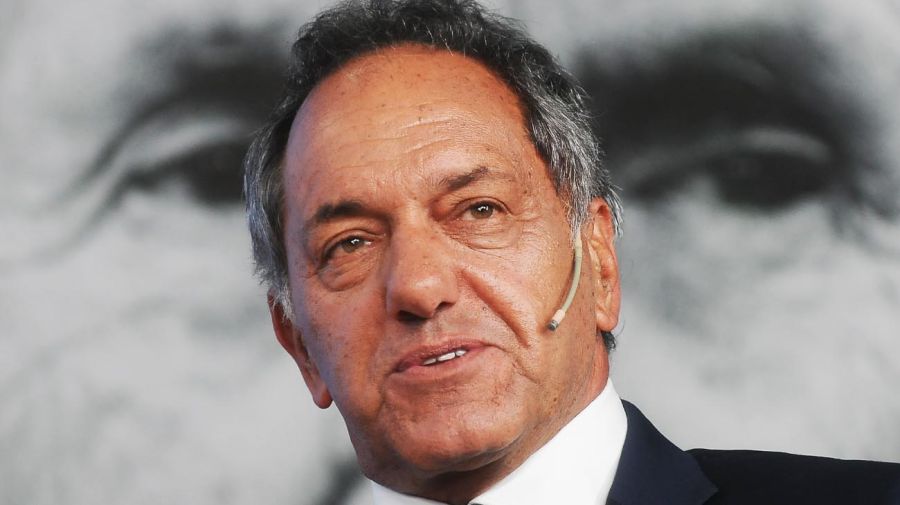
You met Cristina Fernández de Kirchner in the Senate a few weeks ago, how is your relationship with her?
Very good.
How has it evolved in the course of time?
Very well from the personal, political and every standpoint – one of affection and respect. I always like to hear her vision of things, her experience. She was very interested in finding out how I see the political process in Brazil. She was very generous in praising my work, the drive I have given the Embassy. She believes that every embassy has to be a unit for the promotion of Argentine export business.
Do you see any evolution between the Cristina you saw a fortnight ago and the president you knew 15 years ago?
I can imagine how demanding the Presidency is... and the truth is that there was a reason why I was re-elected governor with the biggest percentage of votes in history, that has to do with the joint efforts of the national and provincial governments at that time.
We’ve had our clashes, I tell her jokingly that I know that I have annoyed you in some things but the truth is that I’m always there. How many people can say that they have been in the same political grouping for the last 20 years?
Is your loyalty valued?
Very much so and the passage of time also vindicates it and gives it value. But more than my loyalty, which can sound like a political term, I believe that my commitment, capacity for work and my dedication are valued.
The other component of Frente de Todos is the Frente Renovador. How is your relationship with Sergio Massa?
We spoke a few hours ago about the legislative agenda ahead of us. As I say, I have to work with all the ministers, all the governors and also the ambassadors. On the basis of my experience, I’ve had the trade mission agendas sent to me.
I respect Sergio as a very important pillar within what has been the construction of Frente de Todos. We have a legislative agenda of Ley de Compre Argentino (“Buy Argentine”), electromobility, car parts and the auto industry. We are going to work together and, beyond the different visions or disagreements we might have, I think that there is a greater responsibility to overcome those differences in line with the situation of the country, which requires the best from each of us.
What happened between you in 2013 when you decided not to accompany Massa and Macri in the midterms?
I knew that he would win that election [in Buenos Aires Province] but lose nationwide. I would never place the country’s institutions at risk. And he made me a generous offer with conviction and indeed he did very well, winning that election but for me it was winning an election and then what? So I thought of that. And when you look at history, every time there has been a conflict between the governors of BA Province and the president, the country, the province and the people have suffered.
With what happened later to Macri, given that Massa was allied to him at the time, has history proved you to be right and not Massa?
He won the election, that was his great merit. And afterwards he ran for president in 2015, finishing in third place.
Is that rumour correct that Alberto Fernández told you that if he was not well placed in the opinion polls when the time to draw up the lists for the PASO primaries comes , he would back your presidential candidacy?
No, not at all. I want to rule out any speculation or commentary in that respect. There are evidently problems in Argentina which the president is facing. The truth is that he has had no peace since his government started – first, the pandemic, then the negotiations with the International Monetary Fund, the impact of the war, reconstructing the productive and social fabric and administering these tensions within Frente de Todos. I feel that he is committed to that. And if the Argentine people see the government really fulfilling all their expectations, reviving the economy and responding to all the issues of a family’s daily agenda, the people themselves will request presidential continuity according to his decision and if not, another mechanism will be generated. I do not have individualistic criteria, I’m within a political party, a front, we shall see when the moment arrives. It all seems so premature to me.
Out of the three components of Frente de Todos, one is Kirchnerism, where the talk centres on [Interior Minister Eduardo] ‘Wado’ de Pedro, another is the Frente Renovador with Sergio Massa and then comes Alberto Fernández and possibly you, if not him. Are you talking to 'Wado' de Pedro?
I talk to everybody, I have a very good relationship with Wado. In fact, at one point when the running-mate was being defined, I had conversed with Cristina about Wado joining my ticket.
That would have been in 2015.
In 2015, exactly. We had a very good relationship also because my economy minister Silvina Batakis [in Buenos Aires Province] was working with him.
Could that be the ticket for 2023?
I’m not thinking of any ticket. My worry is how we lift more shutters in factories and how we create youth jobs. I tell you sincerely that I’m committed to that.
If I had been speculating or thinking of that, I’d have stayed in Brazil where I had an agenda of governors and businessmen.
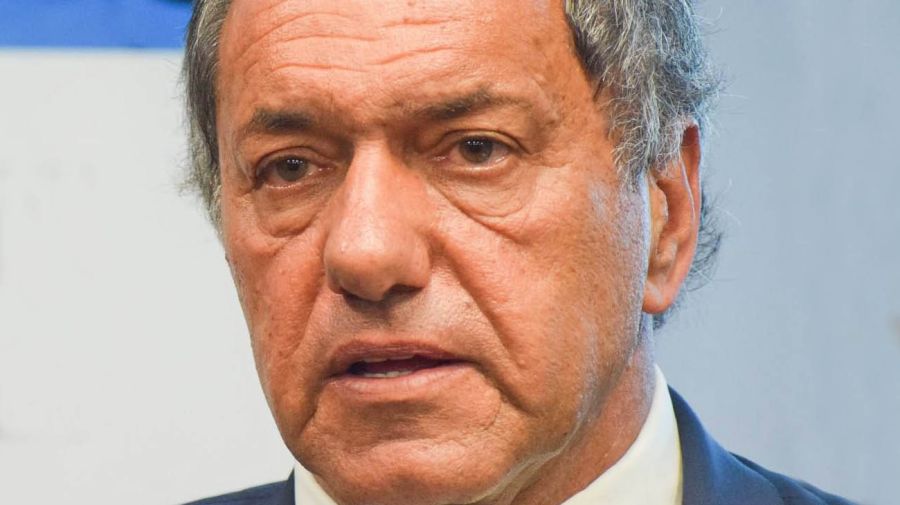
Do you think that Macri could be a presidential candidate next year?
I don’t know how they’re going to sort that one out. Evidently his movements, agenda and definitions have to do with a positioning similar to 2015. He was against everything. Are we going to recover Aerolíneas [Argentinas]? No. Are we going to recover the trains? No. He wanted to be the opposite of every policy and everything we were carrying out.
I believe that at this point in the cycles of democracy, the popular demand is for candidates with other characteristics and I don’t know if the Argentine people in the next election, if he’s successful this time round, won’t want to...
When you revisit your debate with him and what you said, what do you see?
What people tell me, how right I was. But he had his campaign strategy…
Share that with our readers who cannot exactly remember what you said he was going to do and ended up doing.
Everything which happened, even the IMF. But at the time he had a campaign strategy thanks to [spin doctor Jaime] Durán Barba. He knew that the people did not want any change in policies, they perhaps wanted change in other questions, so he said that he was going to uphold them. I remember the message he gave, I think after the PASO primaries, when he said that he was going to maintain Aerolíneas Argentinas. I’m a convinced defender of Aerolíneas because you cannot analyse the result of a company solely in economic terms but also by its social impact on tourism and transport, both nationwide and international, very strong. Having said that, at that time he planned a highly professional campaign with a very clear message which people believed and trusted while I was left behind.
If Macri were the candidate for Juntos por el Cambio, would that be positive for Frente de Todos?
Frente de Todos has to put its greatest efforts into making the country grow and fulfilling people’s expectations, that phrase to which the president refers, and you can already see it. The recovery inland is very strong, they tell me what is happening in Córdoba and Santa Fe where there will be opportunities. We have a great agenda at the Productive Development Ministry with every province. It is also true – and a matter of concern and a priority for the economy minister – that while there is more work and unemployment has dropped to seven percent, people find it hard to make it to the end of the month. That’s also true.
Over and above your not having that explicit objective, do you dream some nights of a rerun of 2015 in 2023 with you and Macri as candidates and this time you win?
I have my feet on the ground more and more. I’m here to help the president and what he decides to do.
After your defeat in 2015 many people saw you as a political corpse and even mistreated you. I remember conversations when at times you even took offence. Is there some sweet revenge in this process of recent years, Brazil and now returning to the national Cabinet?
When I had my accident, they said that I’d never be able to race again and afterwards I was world champion. When I entered politics, they said to me: “How far will you go?” I remember [Domingo] Cavallo in a famous debate telling me: “But what do you know, you drive a speedboat?” But I studied at the Carlos Pellegrini [secondary school] with top marks. The Pellegrini headmaster once called me to say: “They’ve come here to check out your grades; if you studied here, we cannot give them without the authorisation of the pupil.” I replied: “Show everything, please, no problem.”
Being underestimated sometimes motivates me, bringing out my inner force and energy but never in revenge – I’ve never, never looked at life that way. I take it as a challenge to surpass myself, to be able to do good things and feel useful, as I felt useful in reconstructing that relationship with Brazil, which was very hard. They say that in Brasilia you cry twice when you arrive. When we arrived, I remember that night with Gisela and the baby girl. It was 1am, very hard. I have deep roots – Argentina, my friends, everything.
To wind up, I’d like a final reflection of yours: How does this Daniel Scioli differ from 2015?
Brazil permitted me more time to read and study and link up with people, even if I was always an international person fascinated by the world. But being with ambassadors, with an agenda of those characteristics, for example, curiosity as to what the countries of the European Union are implementing, the Ministries of the Future suggested by the United Nations – they are envisaging new technologies with the issues of jobs, the environment, 4G industries and also other questions. In other words, I feel that it was a time to mature, to consolidate and to grow personally and also everything...
That on the intellectual side. And emotionally what is different in Scioli today as against 2015?
The vertigo implied by what is required to govern Buenos Aires Province, evidently much more than driving a speedboat at 250 kilometres per hour in water. This has surely permitted me to settle down more, value many things, admit errors with some self-criticism, see things from another perspective, listen more, understand more – it has a lot to do with that.
Production: Sol Bacigalupo and Natalia Gelfman.







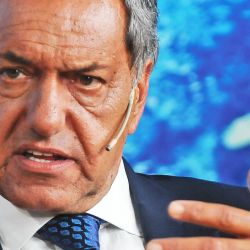

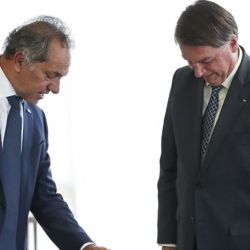
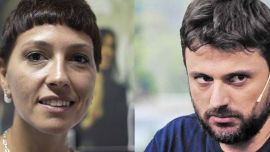

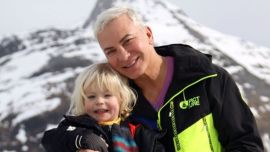








Comments